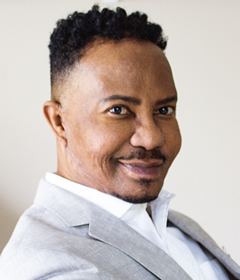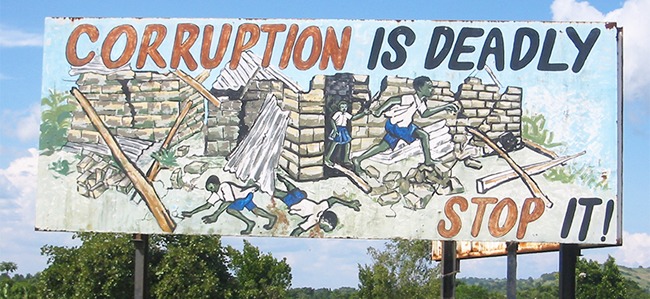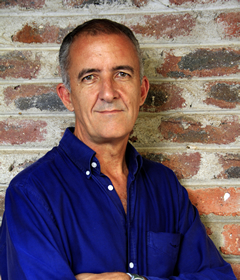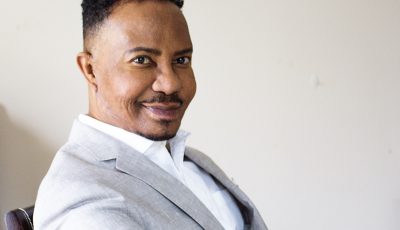

Africa Scene: Murder Out of Africa
This month, we talk “murder” with four widely acclaimed writers of African thrillers—Leye Adenle, Tony Park, Kwei Quartey, and Stanley Trollip.
Tell us a little about yourself and your current books.
LEYE ADENLE: I never know what to say about myself. I’m a writer from Nigeria living in London. I’ve just completed two new manuscripts: Unfinished Business, the third Amaka thriller set in Nigeria, and the first book of a new series set in London I’m calling the Bad Coach series.
KWEI QUARTEY: I’m a physician and the author of the Inspector Darko Dawson and Emma Djan Investigations series. I’m working on one of the last edits for the upcoming second Emma Djan book, Sleep Well, My Lady, and trying to work on the synopsis for the next Darko novel, Night Girl. I was born in Ghana to mixed heritage—American and Ghanaian, but now live in Pasadena, California.
TONY PARK: I’m an Australian who writes novels set in Africa. My wife and I first visited southern African in 1995. We got hooked, came back every year, and since my first book came out in 2004, we’ve lived half of each year in Africa and half in Australia. My 18th thriller, Last Survivor, is about the lucrative and illegal underground trade in African plants. In Last Survivor the rarest cycad in the world, thought to be extinct, is discovered and then stolen to fund a terrorist attack.
STANLEY TROLLIP: I’m South African-born and have homes in Cape Town and Minneapolis in Minnesota in the States. I’m a retired professor of educational psychology and educational technology. I write the Detective Kubu series with Michael Sears and am finalizing a novella, Wolfman, set in northern Minnesota, that I hope to publish this year. I try to spend as much time in the African bush as I can.
What’s in a name? Is it time to have a subgenre called African Crime or African Noir?
LA: I live in perpetual fear of being lovingly praised as the African [insert famous Western writer]. I want to be a damn good writer, end of. That’s a bit different from genre, though, and if Nordic Noir is a thing, well, African Noir is a bigger thing. We all know that the darkest shadows are where the sun is brightest.
KQ: Absolutely, and on its own terms. As Leye says, we don’t want to be called the African Henning Mankell, etc. any more than European or American crime writers want to be compared to an African one. I strongly encourage bookstores and libraries to have an African Crime section in its own right.
ST: Our Detective Kubu has been likened to an African Colombo. That is useful only in so far as it piques a Western reader’s interest. I have tried, more successfully than I expected, to draw attention away from the current tsunami of Nordic Noir by using the term Sunshine Noir—we even published an anthology to which both we, Leye, and Kwei contributed. As for a name, I like the straightforward African Crime Fiction.
TP: I think we’re there already, so, yes, for sure, let’s give it a name. There are enough of us out there.
What makes African Crime special? How does Africa feature as a “character” in your thrillers?
KQ: Africa has a certain power and a larger-than-life presence—its scenery, sights, colors, smells, sounds, and its woes. It doesn’t just make you pay attention to it. Sometimes it can beat you into submission. Think you can get DNA results this afternoon like in the movies? Well, think again. Some director in some lab somewhere just went on leave and nothing can get signed off until he or she returns. And when will that be? “Please, maybe tomorrow. Or next week.”
TP: A big part of my international audience are expatriate Africans and they love reading about their homelands. I love learning and exploring and the more I do of both, the more my love for the continent and its amazing diversity grows. I want to share that love, so Africa emerges front and center as a character in my writing.
ST: Almost everything is different in Africa from Western countries—varied cultures, attitudes to time, belief in spirits, the impact of illnesses, and so on. It’s impossible to transplant any of our stories out of the continent.
LA: I think that just like you can hear the Africa in my voice, in the way I talk, so also you can feel Africa in my writing, and it’s not just because my characters are mostly African and my novels so far have been set in Africa.
All of you spend a lot of time outside of Africa. Why did you choose to set your books here?
LA: Africa is a beautiful, diverse treasure trove for any writer in the know. Even though I’m not on a mission to heal the problems of society, as a crime author you cannot but address the social, economic, and political problems plaguing the city you choose to set your stories in. The demons of Africa are my demons. In writing about them I’m healing myself. I am de-traumatizing.
 KQ: My goal has always been to bring Africa onto the crime stage as an equal, and to showcase what it has to offer with all its cultural and geographical variety and its particular brand of challenges. Having grown up in Ghana, what would be the point of setting my stories in Los Angeles, a city for which Philip Marlowe has done more than enough? I would say cities in Ghana have just as much to say as a Western city anywhere in the world.
KQ: My goal has always been to bring Africa onto the crime stage as an equal, and to showcase what it has to offer with all its cultural and geographical variety and its particular brand of challenges. Having grown up in Ghana, what would be the point of setting my stories in Los Angeles, a city for which Philip Marlowe has done more than enough? I would say cities in Ghana have just as much to say as a Western city anywhere in the world.
TP: For me it’s about inspiration. Africa is where I found the inspiration to write my first published novel, Far Horizon, and it’s continued to deliver ever since. I write crime thrillers so there is never any shortage of material. I’m passionate about wildlife and the environment and in Africa, crime—through poaching and trade in endangered species—also gives me plenty to write about. Africa also inspires me in the other sense of the word—to be uplifted. I see no shortage of good people doing amazing things to protect and conserve the natural environment and help one another.
ST: I used to take summer holidays from my professorship in the US in South Africa. I was a private pilot and often rented a small plane, filled it with friends, and headed to Botswana or Zimbabwe on bird- and game-watching safaris. On one of those, on the Savuti plains of the great Chobe National Park in Botswana, we watched a pack of hyenas hunt and kill a wildebeest. In just a few hours, the beast had disappeared, bones and flesh. Over a glass of wine or two that evening, Michael and I said that if we ever wanted to get rid of a body, there was the solution. No body, no case. We also realized it was a great premise for a murder mystery. About 20 years later that materialized as A Carrion Death.
Both Michael and I are Africans, so writing novels set in Africa is the obvious thing to do. Africa also provides a myriad of opportunities not available elsewhere. And, like Kwei, I think it is time to bring African stories to readers used to frigid Nordic stories or hard-boiled American detectives.
Corruption is a big issue in many African countries, offering plot opportunities as well as difficulties for the police. Sometimes it’s at the heart of the story, sometimes part of the backdrop. Is this a special feature of African crime fiction?
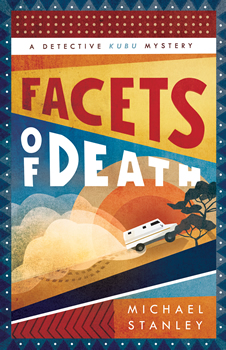 LA: I think the West is a gazillion times more corrupt than Africans who bear the brunt of their corruption can ever catch up with. Witness Mr. Trump. That said, the comical way African leaders, upstarts in the science of fleecing their countries, go about stuffing impossible wealth into Western assets and accounts is just too laughable to be ignored. It’s like they’re gifting writers readymade manuscripts.
LA: I think the West is a gazillion times more corrupt than Africans who bear the brunt of their corruption can ever catch up with. Witness Mr. Trump. That said, the comical way African leaders, upstarts in the science of fleecing their countries, go about stuffing impossible wealth into Western assets and accounts is just too laughable to be ignored. It’s like they’re gifting writers readymade manuscripts.
KQ: My personal experiences with the Ghana Police Service have afforded me a wealth of information on how the corruption works from the bottom to the top. It’s ironic how appalling it is while simultaneously providing a foil for my characters. It’s like the awful gift that keeps on giving. I wish there wasn’t so much corruption, but at the same time—is it ever good material!
TP: Sadly it’s everywhere, a part of the human condition, but unfortunately it’s part of day-to-day life in some of the countries I write about. A few of my books are set in Zimbabwe, and a Zimbabwean friend of mine put it nicely when he said “anyone who lives in Zimbabwe and says they have not committed a crime is a liar.” I write about things that are part of life in Africa and, sadly, corruption does come up. Sometimes it’s in the forefront of my stories.
ST: Of course corruption is rife, perhaps less sophisticated than outside the continent. Something that I usually find missing is that it takes two to tango, as they say. The corrupt African leader has a corrupt counterpart in the West or the East. I’d like to see their role highlighted more.
Do you feel that readers outside of where you set your books have an unrealistic view of Africa?
LA: Absolutely. My job is not to educate them, but to tell a story I enjoyed writing. In other words, I don’t allow the ignorance of some people to interfere with the process or content of my writing.
ST: Not only an unrealistic view, but an uninformed one. When I tell people in the States that I’m from Africa, I quite often hear a tone of sympathy and a comment about how it is such a basket case. “They’re always fighting each other!” When I ask about how the tribes in Europe compare in terms of fighting each other since the beginning of the last century, I usually receive a puzzled look. I’m also usually not regarded as African (for obvious reasons) even though my family has been there for well over 100 years. The same people whose forebears arrived in the States at the same time as mine did in Africa would never regard their offspring as not being American.
KQ: Yes, because readers in general do not understand Africa, a continent with so much variety that it’s impossible to encapsulate it. There is also fear of the unknown. The appellation “Dark Continent” is such a misnomer. Nothing dark about it. It’s bright and vibrant.
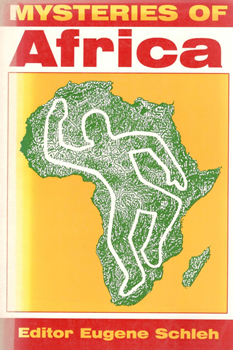 TP: Yes, and for different reasons. Some people have an unrealistic view because they’ve never been, and some who have lived in Africa but left have a distorted view. Some of my readers who left South Africa and Zimbabwe almost want to believe that everything is in ruins in their home countries, but I like to point out positives as well as negatives.
TP: Yes, and for different reasons. Some people have an unrealistic view because they’ve never been, and some who have lived in Africa but left have a distorted view. Some of my readers who left South Africa and Zimbabwe almost want to believe that everything is in ruins in their home countries, but I like to point out positives as well as negatives.
KQ: I use a lot of local dialect in my stories and get a lot of grief from my editors, who sometimes claim it’s “confusing.” Sometimes I feel like they are deliberately trying to strip African flavor from my dialogue. I could be wrong. What are your experiences?
TP: Same! When I use certain South Africanisms my editors are always trying to correct me. When a character says “now now,” my editor will always try and delete the second now! There are other turns of phrase and even unusual sentence structure which, as much as individual words, convey to a reader that your character is from a different culture.
ST: I think readers really like local expressions and local color. I think editors—especially young American editors—are somehow always trying to Americanize the books. I love it that Tony mentioned “now now” as being a South African expression meaning immediately. It’s part of a family of “now” expressions that have a somewhat flexible range of meanings. I’ve always used “now now” to mean there is some urgency, but it can be put off to some near point in the future. (The equivalent of mañana.) Something less urgent than “now now” calls for “just now.” To get something done with urgency it needs to be done “right now.” The whole thing fits nicely with “African” time.
Finally, who is your favorite African thriller writer (not on this panel) and why?
LA: Oyinkan Braithwaite. Her debut, My Sister the Serial Killer, reminded me of why I love to read.
KQ: I have enjoyed Malla Nunn’s work because of how she evokes the Apartheid era. I also like Mukoma Wa Ngugi’s novels.
TP: John Gordon Davis, author of Hold My Hand I’m Dying and many other wonderful novels during the ’70s, ’80s, and ’90s.
ST: James McClure for his wonderful, Apartheid-time Kramer and Zondi novels.
Thanks to all of you. Whether you call it African Crime or African Noir, this is a genre of the future! Keep writing.
- International Thrills: Fiona Snyckers - April 25, 2024
- International Thrills: Femi Kayode - March 29, 2024
- International Thrills: Shubnum Khan - February 22, 2024



